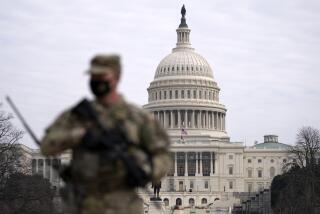Senate Passes Bill Curbing Military Pension Benefits
WASHINGTON — The Senate on Thursday approved a bill that seeks to cut the federal deficit by reducing military pension benefits for new recruits.
The bill, approved 92 to 1, would save an estimated $2.9 billion this fiscal year by restructuring current methods of calculating pension benefits.
75% After 30 Years
The existing retirement plan provides a pension of half of an individual’s base pay after 20 years of service, with payments rising 2.5% for each additional year of service to a maximum of 75% of base pay at 30 years. Those leaving before 20 years get no pension.
The Senate’s bill provides for a pension of 44% of base pay after 20 years, rising 3.1% for each additional year to a maximum of 75% at 30 years.
The bill now goes to a joint conference committee, which must work out differences between the House and Senate versions of the legislation. The changes will affect only those who enlist after the measure is signed by the President.
The Older ‘the Better’
Sen. Barry Goldwater (R-Ariz.), arguing in favor for the bill, maintained that the current retirement system lacks incentive for enlisted personnel to extend their tours of duty beyond the 20-year mark. “We’re getting rid of people who are too young to get rid of. The older a person gets, the better he gets,” he said.
The legislation would not affect an estimated 1.4 million retirees now receiving military pension benefits or 2.1 million officers and enlisted men on active duty.
Three weeks ago, House Democrats voted 399 to 7 to pass a similar bill that is designed to save $3.1 billion this year. The House bill starts at 40% after 20 years, rising 3.5% each additional year to the 75% ceiling.
Both measures have faced strong opposition from the military. Defense Secretary Caspar W. Weinberger and the Joint Chiefs of Staff argue that changes in the pension package could harm efforts to attract and retain recruits for the nation’s all-volunteer military force.
Warning by Wilson
But Sen. Pete Wilson (R-Calif.) warned that, if Congress waits to enact reform measures, current personnel and potential recruits may be reluctant to consider a lifetime military career.
Supporters of the measure said that, unless the military retirement system is restructured, pension payments will skyrocket to about $45 billion by the year 2000. The number of military retirees rose from 300,000 in 1960 to today’s 1.4 million.
More to Read
Get the L.A. Times Politics newsletter
Deeply reported insights into legislation, politics and policy from Sacramento, Washington and beyond. In your inbox three times per week.
You may occasionally receive promotional content from the Los Angeles Times.










